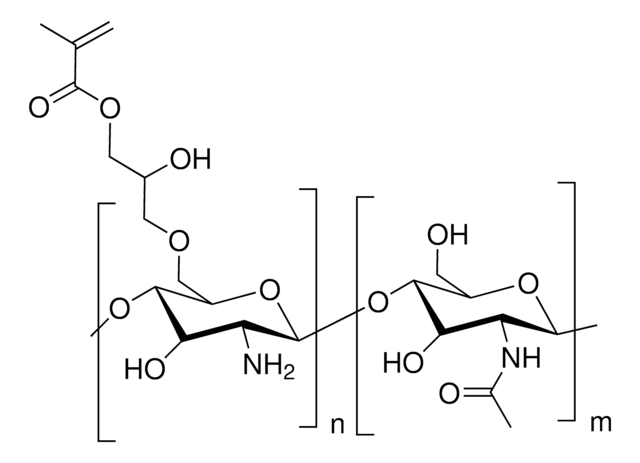923842
Alginate Aldehyde
35% aldehyde content, medium viscosity
Sinónimos:
Alginate aldehyde, Oxidized alginate
About This Item
Productos recomendados
Quality Level
description
Degree of functionalization: 30-40%
form
powder
sheet resistance
15.6m Ω/sq (25 mum after curing at 150 Celsius for 5 min on glass)
color
white to off-white
suitability
conforms to structure for NMR
storage temp.
2-8°C
SMILES string
CO[C@H]1[C@@H](O)[C@H](O)[C@H](O/C(C=O)=C\C([O-])=O)O[C@@H]1C([O-])=O.OC2[C@H](OC(O)C=O)[C@@H](C([O-])=O)O[C@@H](OC)[C@H]2O
¿Está buscando productos similares? Visita Guía de comparación de productos
Categorías relacionadas
Application
Alginate is commonly crosslinked into a hydrogel via ionic-crosslinking with divalent cations (e.g., Ca2+). To prevent matrix degradation, alginate can be functionalized with reactive groups that can be chemically crosslinked, such as aldehydes.[5] Aldehyde- functionalized alginate can be used to prepare hydrogels by reaction with amine groups, such as gelatin through Schiff-base reaction to form a chemical hydrogel. This material can be used in a variety of biomedical applications such as the delivery of drugs, cells, or biomolecules in different tissues, wound healing, and muscle and bone tissue engineering. [6]
Storage Class
11 - Combustible Solids
wgk_germany
WGK 3
flash_point_f
Not applicable
flash_point_c
Not applicable
Elija entre una de las versiones más recientes:
Certificados de análisis (COA)
¿No ve la versión correcta?
Si necesita una versión concreta, puede buscar un certificado específico por el número de lote.
¿Ya tiene este producto?
Encuentre la documentación para los productos que ha comprado recientemente en la Biblioteca de documentos.
Nuestro equipo de científicos tiene experiencia en todas las áreas de investigación: Ciencias de la vida, Ciencia de los materiales, Síntesis química, Cromatografía, Analítica y muchas otras.
Póngase en contacto con el Servicio técnico






